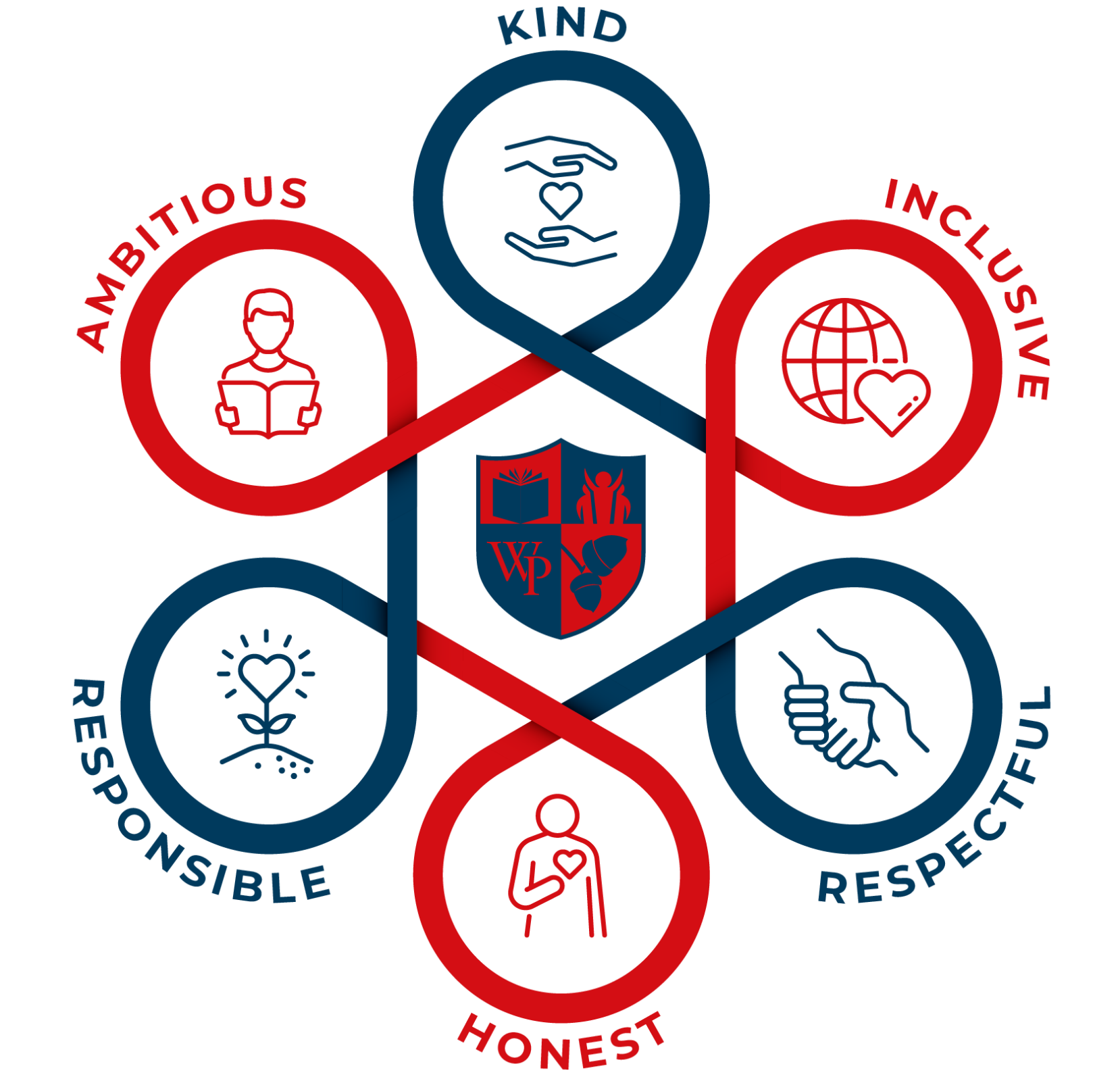Curriculum
Our curriculum lead is Deputy Headteacher Elizabeth Renouf-Crotty. To find out more about the curriculum, email office@watlingparkschool.org.uk and ask to be put in touch with Ms Renouf-Crotty.
Intent
We believe in the value of a lifelong learning journey which continuously stimulates, excites and compels everyone within our school community, children and adult, to learn and improve on a daily basis. We promote a clear view that learning requires effort and perseverance, but will ultimately pay rich rewards.
Our teaching equips children with the knowledge, skills and understanding necessary to develop as independent, confident and successful individuals who can make informed and ambitious choices, in the classroom and outside of it, along with making positive contributions to the community around them.

Every aspect of our curriculum is underpinned by our core values:
- Kind
- Ambitious
- Inclusive
- Respectful
- Honest
- Responsible
as well as the five British Values:
- Democracy
- The rule of law
- Individual liberty
- Mutual respect
- Tolerance of those with different faiths and beliefs.
As an academy we have the flexibility to tailor our curriculum to better meet the needs of our community. Our curriculum is broad, balanced, and enriching. While it aligns with the National Curriculum, it is thoughtfully designed to enhance and expand the learning experiences that are most relevant and meaningful to our children.
We reinforce core subjects through a carefully structured approach to foundation subjects. Each unit of learning builds upon previous knowledge, is engaging and purposeful, and encourages curiosity and critical thinking. These units culminate in an outcome that allows us to reflect on learning and celebrate progress.
The personal, social, and emotional well-being of our pupils is at the heart of everything we do, supporting their overall development and health. Additionally, oracy is embedded throughout our curriculum, ensuring that all children develop strong speaking, listening, and vocabulary skills—foundations essential for effective communication now and in the future.
Implementation and Growth Mindset
Our curriculum is thoughtfully structured to ensure a clear and coherent progression of knowledge and skills. Each child’s learning journey is carefully mapped out from year to year. Subject content is deliberately planned, with dedicated time allocated to ensure every subject receives the focus it needs.
This allows pupils to embed core concepts into long-term memory and retrieve and apply them with confidence. Key vocabulary is clearly identified and explicitly taught in each subject. Our core values are woven throughout every area of the curriculum.
Our staff maintain high expectations for all learners and believe in every child’s potential to succeed. We champion a Growth Mindset, recognising and celebrating both effort and academic achievement. We are mindful of cognitive load and design purposeful learning environments and resources that support focus and reduce distractions.
Learning is delivered in manageable steps to support memory retention. Teachers use modelling and worked examples to scaffold new ideas and concepts. Each learning sequence includes planned opportunities for vocabulary development, consolidation of prior learning, and addressing misunderstandings before moving forward.
Thoughtfully crafted questions are posed to all learners, with partner discussions encouraging deeper thinking, curiosity, and recall. Success criteria guide pupils toward understanding what success looks like in each lesson, promoting independence and fluency in applying their knowledge and skills. Throughout lessons, teachers support learning by questioning, correcting misconceptions, and connecting ideas across topics to deepen comprehension.
A rich variety of extra-curricular activities—including themed weeks, immersive days, competitions, and clubs—enhance the curriculum, raise the profile of subjects, and offer meaningful, memorable experiences that further embed learning.
We also foster a deep love of reading through engaging texts, targeted reading opportunities, and vocabulary exploration. By introducing influential figures from each subject area, we inspire an appreciation for creativity, innovation, and human achievement across disciplines.
Impact
Our curriculum provision engages children, develops an inquiring mind, and supports collaboration, creativity, and personal success.
The well-constructed and thought-through curriculum not only engages all children within their learning journey, but also develops them as a member of society and leads to good academic progress. All learning builds towards creating well-rounded individuals who have a positive impact on the world now, and leave with the skills to impact our world for years to come.
Teachers are able to provide challenge, stretch and enrichment in learning because they know the starting points of individuals and understand the progression required to reach the end goal. In order for gaps within learning to be identified and closed, a range of assessment and analysis strategies are utilised:
- timely feedback
- internal testing
- moderation of work
- pupil interviews
- use of assessment grids and
- data tracking systems.
Monitoring shows that children are motived, engaged and active in their learning, can construct their own knowledge and are able to think flexibly and creatively. They take pride in themselves and their school.
Assessment
Assessment information is analysed by class teachers together with the middle and senior leadership teams as part of our monitoring cycle. Pupil progress reviews are conducted regularly and provide the senior leadership team with an accurate and comprehensive understanding of the quality of education in our school.
We determine our monitoring cycle at the beginning of each academic year. This identifies the baseline for all year groups, in all subject areas. Monitoring includes book scrutinies, lesson observations, learning walks, and includes the voice of pupils, parents and staff. All this information is gathered and reviewed. It is used to inform further curriculum developments, and provision is adapted accordingly. Overall, results show that we are making improvements and children are achieving well.







